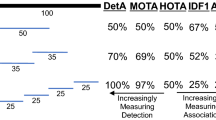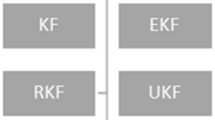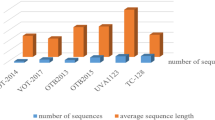Abstract
In order to improve the performance of the probability hypothesis density (PHD) algorithm based particle filter (PF) in terms of number estimation and states extraction of multiple targets, a new probability hypothesis density filter algorithm based on marginalized particle and kernel density estimation is proposed, which utilizes the idea of marginalized particle filter to enhance the estimating performance of the PHD. The state variables are decomposed into linear and non-linear parts. The particle filter is adopted to predict and estimate the nonlinear states of multi-target after dimensionality reduction, while the Kalman filter is applied to estimate the linear parts under linear Gaussian condition. Embedding the information of the linear states into the estimated nonlinear states helps to reduce the estimating variance and improve the accuracy of target number estimation. The meanshift kernel density estimation, being of the inherent nature of searching peak value via an adaptive gradient ascent iteration, is introduced to cluster particles and extract target states, which is independent of the target number and can converge to the local peak position of the PHD distribution while avoiding the errors due to the inaccuracy in modeling and parameters estimation. Experiments show that the proposed algorithm can obtain higher tracking accuracy when using fewer sampling particles and is of lower computational complexity compared with the PF-PHD.
Similar content being viewed by others
References
GOODMAN I, MAHLER R, NGUYEN H. Mathematics of data fusion [M]. Norwell, MA, USA: Kluwer Academic Publishers, 1997: 97–108.
MAHLER R. Multitarget Bayes filter via first-order multitarget moments [J]. IEEE Trans on Aerospace and Electronics Systems, 2003, 39(3): 1152–1178.
VO B N, MA W K. The Gaussian mixture probability hypothesis density filter [J]. IEEE Trans on Signal Processing, 2006, 54(11): 4091–4104.
VO B N, SINGH S, DOUCET A. Sequential Monte Carlo methods for multitarget filtering with random finite sets [J]. IEEE Trans on Aerospace and Electronics Systems, 2005, 41(4): 1224–1245.
VO B T, VO B N, CANTONI A. Analytic implementations of the cardinalized probability hypothesis density filter [J]. IEEE Trans on Signal Processing, 2007, 55(7): 3553–3567.
ZHOU Wei-dong, ZHANG He-bing, JI Yu-ren. Multi-target tracking algorithm based on SMC-CPHD filter [J]. Journal of Astronautics, 2012, 33(4): 443–444. (in Chinese)
CLARK D E, BELL J. Multi-target state estimation and track continuity for the particle PHD Filter [J]. IEEE Trans on Aerospace and Electronics Systems, 2007, 43(4): 1141–1453.
ZHUANG Ze-sen, ZHANG Jian-qiu, YIN Jian-jun. A kernel particle probability hypothesis density filter for multi-target tracking [J]. Acta Aeronautica Astronautica Sinica, 2009, 30(7): 1265–1270. (in Chinese)
HAN B, COMANICIU D, ZHU Y. Sequential kernel density approximation and its application to real-time visual tracking [J]. IEEE Trans on Pattern Analysis and Machine Intelligence, 2008, 30(7): 1186–1197.
SCHON T, GUSTAFSSON F, NORDLUND P J. Marginalized particle filters for mixed linear/non linear state-space models [J]. IEEE Trans on Signal Processing, 2005, 53(7): 2279–2289.
ZHAN Rong-hui, ZHANG Jun. Nonlinear filtering theory with target tracking application [M]. Beijing: National Defence Industry Press, 2013: 141–144. (in Chinese)
ZHANG Jun-gen. Research on particle filter and its application to target tracking [D]. Xi’an: Xidian University, 2011. (in Chinese)
CHANG C, ANSARI R. Kernel particle filter for visual tracking [J]. IEEE Signal Processing Letters, 2005, 12(3): 242–245.
PANTA K, VO B N. Convolution kernels based sequential Monte Carlo approximation of the probability hypothesis density filter [C]// Proc of the 2007 Information, Decision and Control. Adelaide, Australia, 2007: 336–341.
CAMPILLO F, ROSSI V. Convolution particle filter for parameter estimation in general state space models [J]. IEEE Trans on Aerospace and Electronic Systems, 2009, 45(3): 1063–1072.
SCHUHMACHER D, VO B T, VO B N. A consistent metric for performance evaluation of multi-object filters [J]. IEEE Trans on Signal Processing, 2008, 56(8): 3447–3457.
SCHON T, KARLSSON R, GUSTAFSSON F. Complexity analysis of the marginalized particle filters [J]. IEEE Trans on Signal Processing, 2005, 53(11): 4408–4411.
Author information
Authors and Affiliations
Corresponding author
Additional information
Foundation item: Project(61101185) supported by the National Natural Science Foundation of China; Project(2011AA1221) supported by the National High Technology Research and Development Program of China
Rights and permissions
About this article
Cite this article
Zhang, Lp., Wang, Lp., Li, B. et al. Kernel density estimation and marginalized-particle based probability hypothesis density filter for multi-target tracking. J. Cent. South Univ. 22, 956–965 (2015). https://doi.org/10.1007/s11771-015-2606-7
Received:
Accepted:
Published:
Issue Date:
DOI: https://doi.org/10.1007/s11771-015-2606-7




